Last month I wrote a blog post about the number of men speaking at Relief Society conferences and events compared to women, despite the Relief Society being a women’s organization. The day after that posted I checked my email and saw a message from my ward Relief Society presidency, encouraging us to read a talk by Elder Gong (a man) before we study it together on Sunday in class.
This got me thinking, and I searched for other unread messages from her. Sure enough, two weeks before that was another email encouraging me to read another talk by another man for the last Relief Society meeting.
I didn’t have any more emails remaining in my inbox, so I went to our ward Relief Society Facebook page to see if they updated lesson plans there. They didn’t, but as I started scrolling I realized that the vast majority of links and announcements were not about things female church leaders were teaching or doing, but almost all of them were about male leaders and what the men were teaching and doing.
I scrolled through 24 months of Relief Society Facebook posts, and each time I found one that was a link to a talk for a lesson, an invitation to a fireside or conference, or a woman in my ward sharing an outside quote or book reference, I took a quick screenshot. To preserve privacy I cut out any names or identifying details, but I left the image of the talk, conference, fireside or quote in the screenshot. To make it easy to see at a glance whether the person highlighted in the post was male or female, I put a pink check mark on the female posts, and a blue check mark on the male posts. (And when there was a mixture, I put checkmarks to indicate about how many of each.)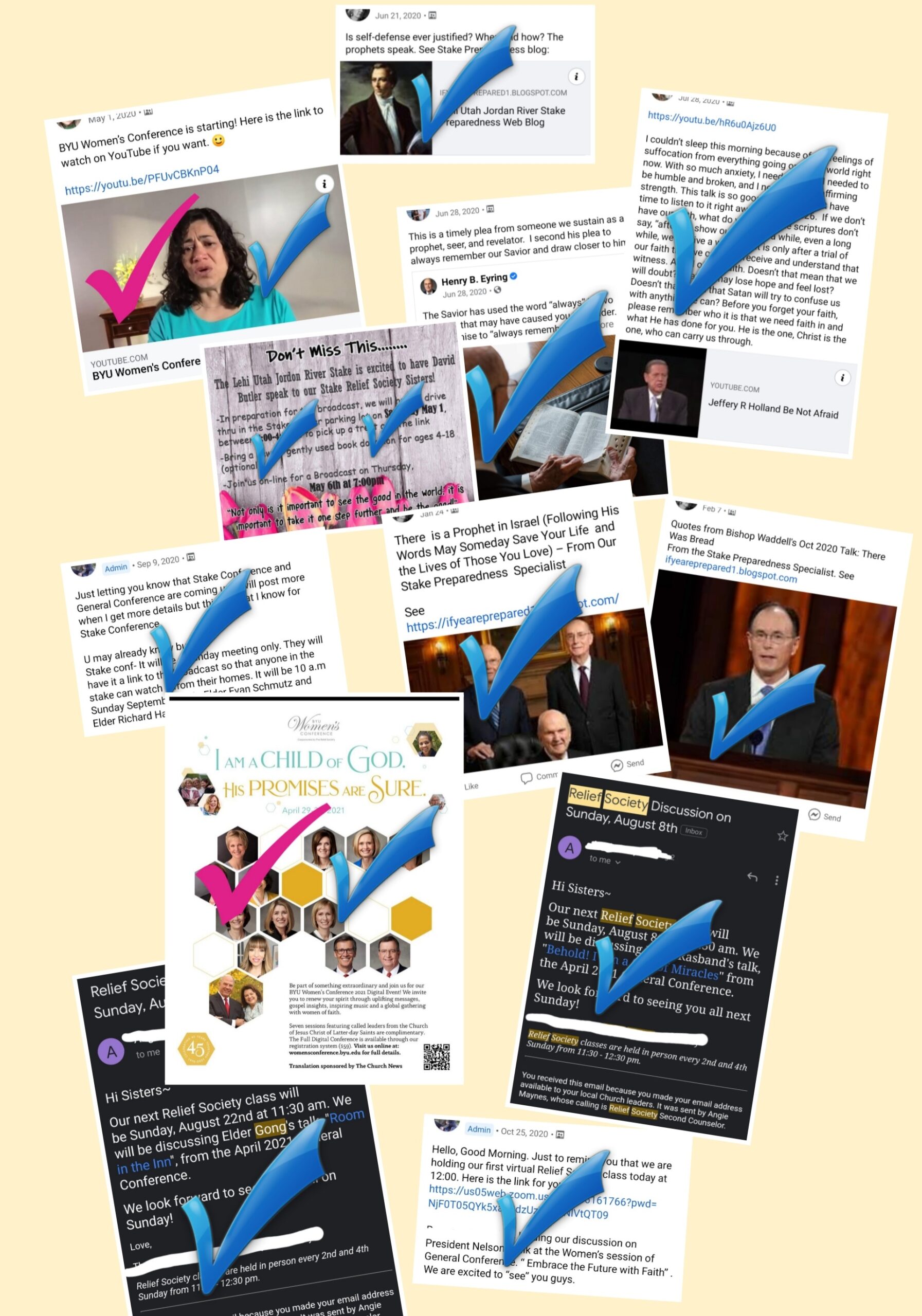
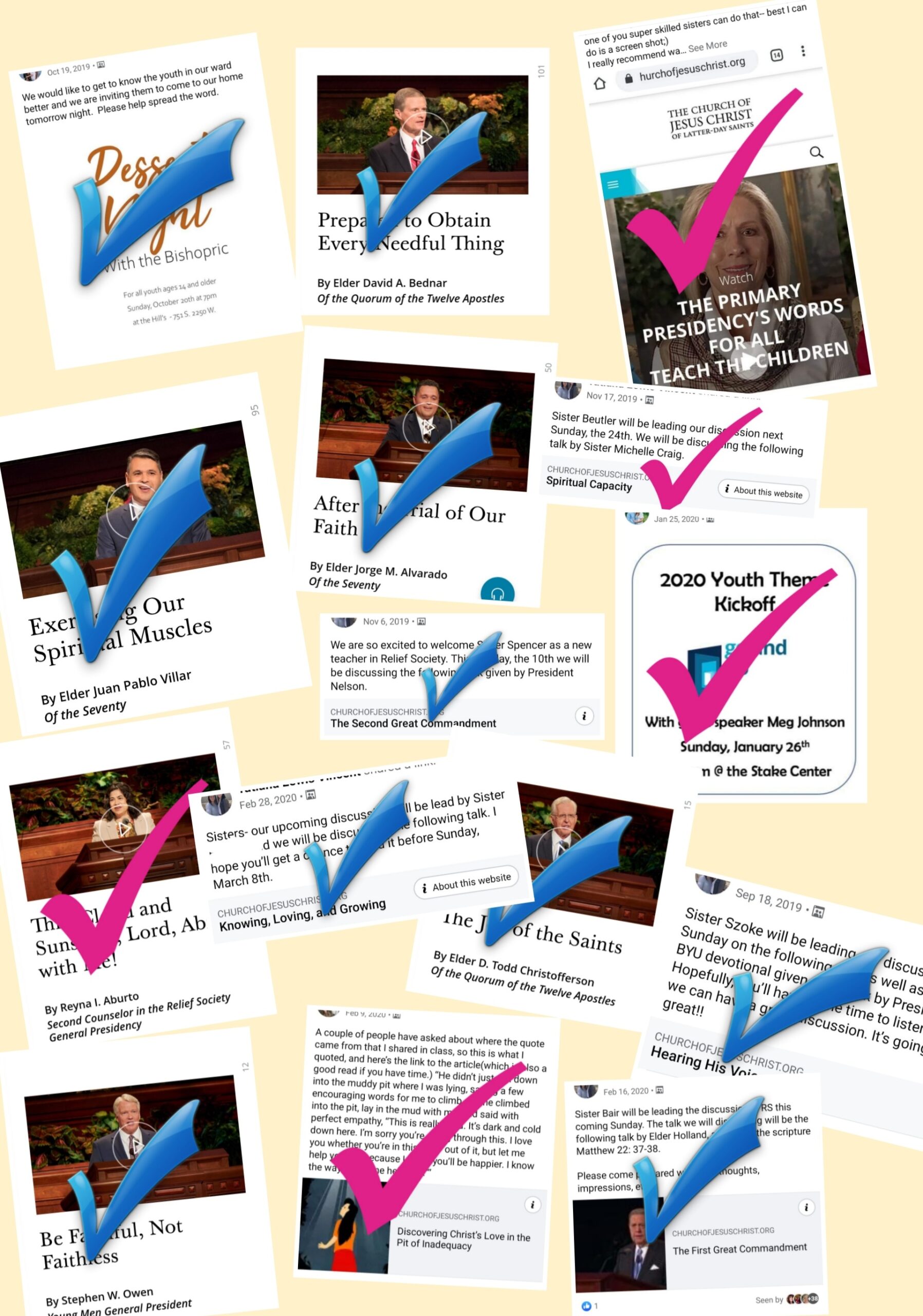
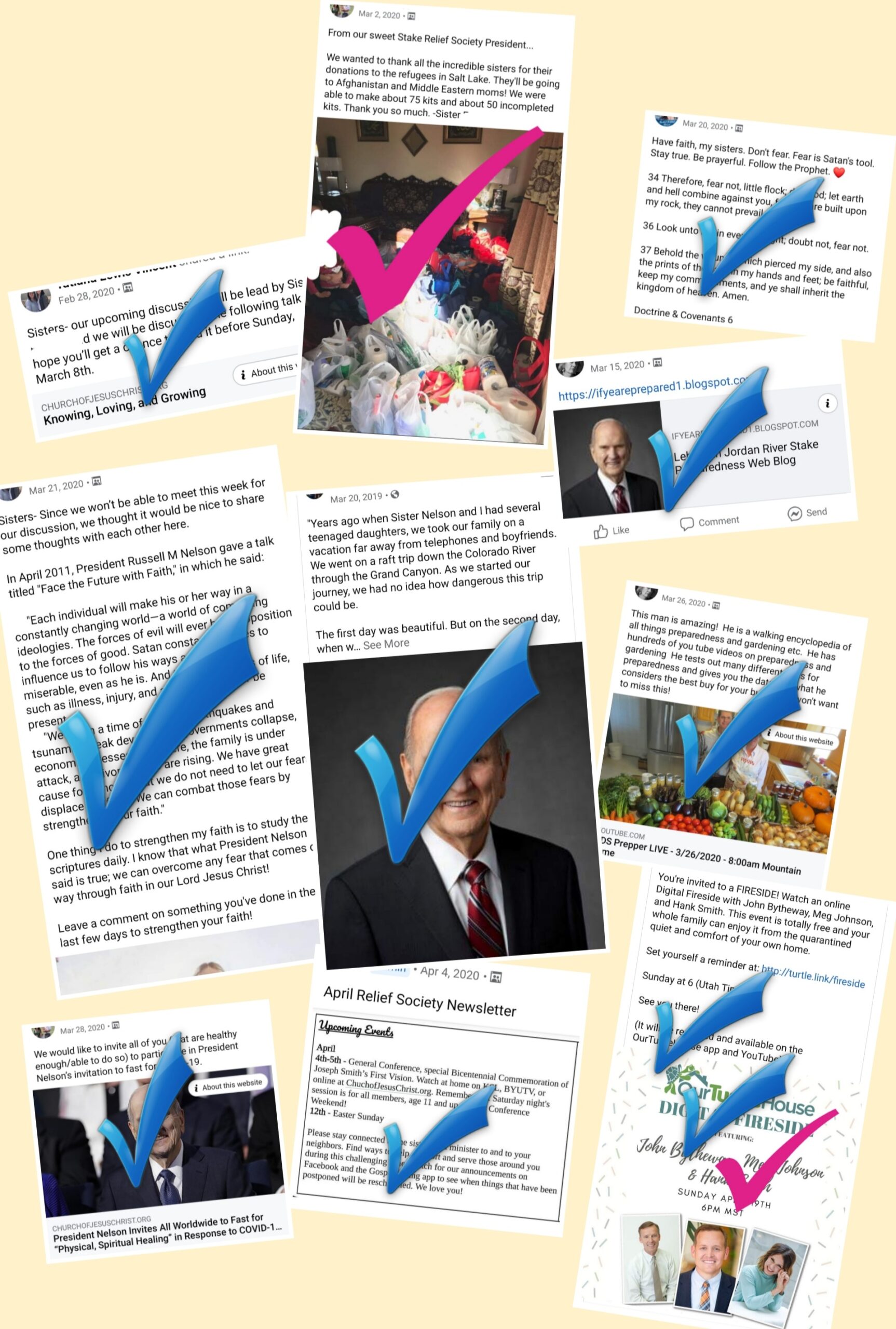
As always, there’s nothing wrong with learning from inspired men. However, what *does* bother me is that in a women’s organization we choose to elevate male voices far more frequently than we elevate female voices. When we find an idea worth sharing with each other, it’s usually an idea from a man. When we want to tell a story, we tell the experience of a man’s life instead of one from our own. On my ward Relief Society’s Facebook page, a group for only women (well, plus the bishopric who is also inexplicably in there), women’s voices got 9 pink check marks, while men’s ideas got 33 blue check marks. In the past two years, women’s words were represented in our group posts only 21 percent of the time.
I think that LDS women have become so accustomed to being instructed by men that we aren’t even aware of the disparity. We lift up the words of men at the expense of other women and don’t even notice that we’re doing it. In general conference, I hear women at the pulpit spending a lot of their time quoting male apostles and prophets (sometimes from the exact same men who have already spoken/will speak in the same meeting!) rather than taking the opportunity to share their own original interpretation of doctrine. In Sacrament Meeting, I see a women at the pulpit giving a talk, but they are often summarizing a favorite conference talk from a male apostle or prophet. In Relief Society, I’ve seen many female teachers at the front of the classroom discussing Teachings of the Prophets, yet never once did we study the Teachings of General Relief Society Presidents.
It’s fine to be an organization that studies the words of men, but only allows women to be members – just don’t call it a women’s organization when it’s clearly not one. Also, give us a fair warning about how male-centric it can be before we decide if we want to join or not, and don’t make membership automatic and mandatory. Some of us would like to opt out.



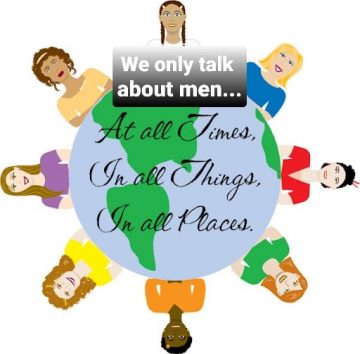

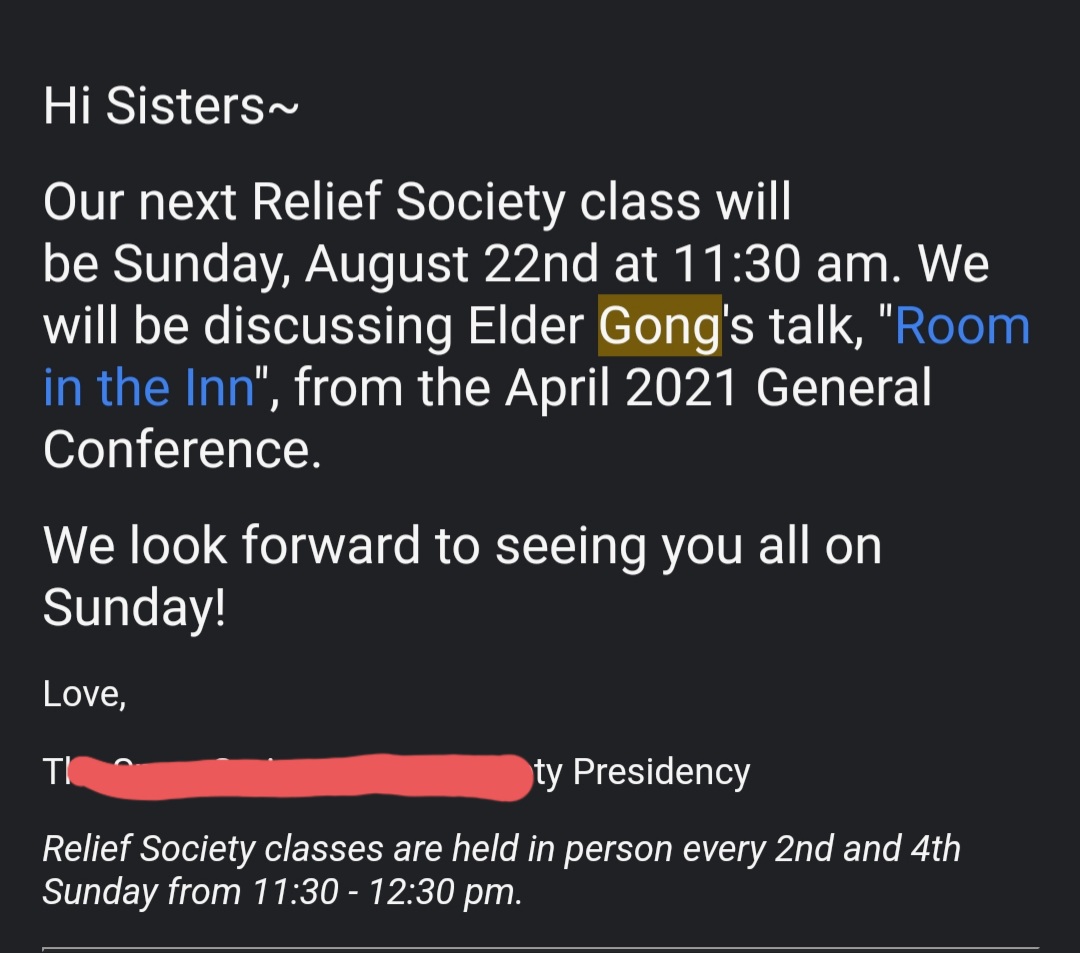
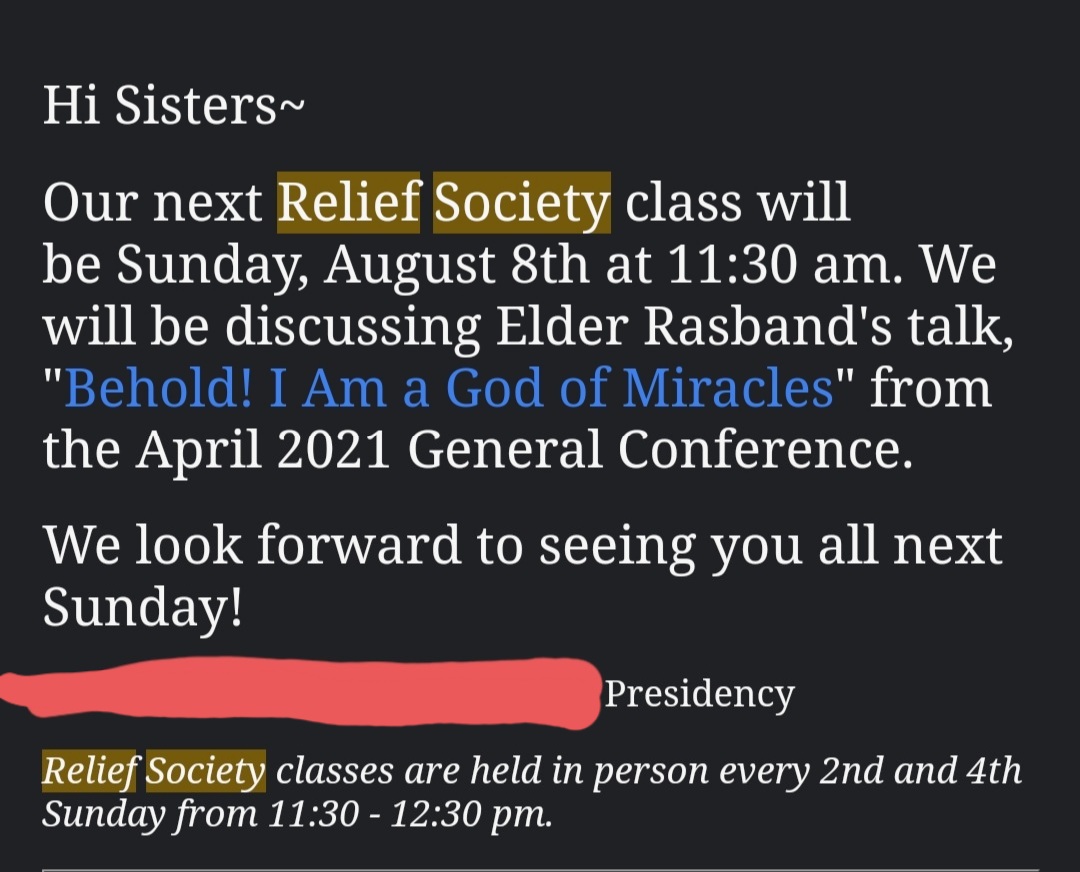


27 Responses
Yes! This reminds of me Chieko Okazaki’s (former counselor in the general Relief Society presidency) interview with Greg Prince in Dialogue. The Relief Society GP was working on new manuals to address the needs of women when they were informed that the men had already nearly finished a manual about Harold B. Lee for the women to use, without having included them in the decision. This was the first manual in the Teachings of the Presidents of the Church series. While after Okazaki and her presidency spoke up women were added the committee, I don’t think they ever gained creative control over the content of the Relief Society manuals. And now the lessons come from General Conferences addresses, and even if a ward used every single talk from a woman, they wouldn’t have enough talks by women to use even twice a month between conference sessions. We are decades into Relief Society lessons being specifically designed to focus on the words and actions of men.
https://www.dialoguejournal.com/wp-content/uploads/sbi/articles/Dialogue_V45N01_CO.pdf
what’s ironic about this is that male Church leaders defend the male-only priesthood as part of God’s plan since men and women are so “different”. If men and women are so different, why don’t the men think that women need to hear different messages and different speakers than they do? Why don’t the men think it’s important to include these different voices in their meetings and decisionmaking? The more different by nature we are, the less appropriate it is to assume that women can get all their needs met by listening to men. Etc.
Of course, I think men need to hear from other women just as much as women do, so I don’t buy into that reasoning. But to me it demonstrates that men don’t just think women are different. They think women are inferior.
That’s such a great point, Elisa. It really does expose the “men and women are so different” line as just a convenient way to try to shut women up, rather than any true belief they hold.
This is what I have always thought. You can’t have it both ways. We are either very different and women don’t hold the priesthood, in which case they need their OWN organization and leaders, and talks, and should sit on EVERY committee to give the female perspective OR we are the same and don’t need to do that – in which case we should hold the priesthood. The fact that its inconsistent tells you its BS.
If the women of the Church just refused to continue serving and working and participating until we were made equal, the men of the Church would have no choice but to make huge changes because the Church couldn’t function without women.
But things like this make me realize that will never ever happen because so many women are equal participants in and contributors to their own subordination and silencing. Beyond depressing.
I love the opting out option.
Or how about having to opt-in in the first place! We always talk about how big our organization is (we’ll even call it the “world’s largest women’s organization”, although it’s nowhere even close to being that). Regardless, can we really brag about numbers at all when we just automatically sign every woman up at 18 and consider her a member until she’s dead? How many women are counted who literally haven’t been to a meeting in decades? How many other organizations sign people up as teenagers and count them forever on their roles, even if the person never comes back to another meeting ever again in her life?
Amen and amen. So true. So dishonest of them.
My experience, as somebody living outside the Utah corridor, was that the only time I could ever access teachings by female leaders in a group setting with other sisters was if general conference graced us with a couple of woman speakers or if I I paid for it handsomely via Time Out for Women (which I could never afford to do, because I was paying so much in tithing to the brethren!).
Church HQ regularly sends leaders out to speak at our stake conferences, but never once have they ever sent a woman leader out to speak to us.
I am glad that you pointed our this glaring gender disparity, because it is a glaring problem for a religion whose membership is made up of a majority of women and whose unpaid labor is carried out mostly by women (the auxiliaries in each ward are staffed by many more women than any priesthood org I have ever seen).
We had a regional conference “for women”that had 5 men speakers. My husband was shocked when I told him that was why I wasn’t attending.
Thanks for documenting this, Abby. I appreciate your work to get the data to show the problem. I think you’re spot on that LDS women are largely used to having men dominate all speaking and all spaces everywhere, so it doesn’t seem out of place for men’s words to dominate even your ward’s RS space.
Switching to only teaching Conference talks in Relief Society has gutted any chance of actually hearing a woman’s voice during a Sunday lesson. Remember how back in the olden days of (I think it was) three or four years ago a RS presidency member would teach the first Sunday lesson on any topic she chose? One of the most spiritual experiences I’ve had was teaching one of those. I started with the book of Ruth and then transitioned to a discussion about the atonement. I realized after teaching that lesson that it had been powerful largely because I taught it with an authentic voice. I was teaching what was speaking to me spiritually at the time, even though I had never heard a church talk teach the exact same way. Teaching that lesson taught me that most talks and lessons that women give are patterned after men’s way of teaching at church, because men are the leaders with authority.
Now the handbook says RS meetings “focus on topics in one or more talks from the most recent general conference.” The topic you want to discuss wasn’t covered last conference? Bummer for you. There’s no longer a dedicated space for a courageous presidency member to teach with her own voice on a topic of her own choosing, and I’ve mourned that.
I remember giving lessons that were only vaguely connected to what was in the lesson manual, now that you mention it. I wanted to share what was speaking to me at the moment, not what was in a boring conference talk the last fall. A Relief Society president should definitely have the flexibility (at least occasionally!) to choose her own topics for discussion with the members of her ward. What’s the point of having local leaders if they’re not allowed to lead at the local level anyway? Why not just play recordings of general conference talks on repeat on Sundays?
It’s not that I even remember most 1st Sunday lessons being super amazing or anything. More often then not it seemed like they were based off of something the bishop or stake president or the prophet said. Or a conference talk. But at least there was a space she could take if she wanted to.
Recently we were asked to “focus on the priesthood in Relief Society”. We already do, so much! My suggestion was to tell the men to “focus on the Relief Society in priesthood quorums” but I don’t think it went anywhere…
I loved teaching like that. I am no longer participating in RS much due to it is just lame.
It’s the same desensitization when it comes to an all male Godhead. When you think about it, it is so unnatural to elevate and worship only one half of humanity. We essentially worship maleness and ascribe all positive qualities, stereotypically male and female, to the male Godhead. How can you be a better nurturer? Look at Jesus, a perfect man’s example. Or pray to your male Father for help. Are you struggling with your role as a woman? Don’t worry. Your male Father loves you, so despite how men treat you, know that the love of a male deity gives you worth. Want to be a better sister or ministering sister? Read a talk from a male authority about it because the authority was inspired by a male god on sisterly support. Or if you read a talk by female officer (new official-sounding term because we disguise the lack of female authority with meaningless titles), know that she got her inspiration from a male god.
This structure and way of thinking is astoundingly absurd and even more so, as mentioned above, for a religion that prides itself on separate but equal roles for men and women. I love Heavenly Father and Jesus, but the Mormon insanity of ignoring and silencing Heavenly Mother, lest we offend her or Heavenly Father, is antithetical to Christ’s gospel. It’s laughable to think people will be condemned in the next life for drinking coffee, swearing, or a multitude of lesser sins, and act like there will be no condemnation for the negation of the divine feminine and the subjugation of women that accompanies it. But I guess the male leaders think they will only be facing Dad and Jesus on the day of judgment because Mom will probably be watching all the spirit kids or getting the refreshments ready for the menfolk.
Oof, yes. So what next? Is it even possible to cultivate a healthy female spirituality in this spiritual desert? This is what I am thinking about a lot.
It’s hard. I don’t have an amazing answer. I left church 2 years ago after accepting many of these realizations. But it is depressing to me to realize how even other sects of Christianity are still so male centric in their conception of the divine. I’m trying to find my own spiritual path and am not sure where it will lead. I really hope the church can one day give Heavenly Mother and women their rightful place. But I think I may be long gone if/when that happens.
The church is small t true, not capital T true. Deep diving in to church history and the “restoration” is an eye-opener of how horrible women have been treated since the very earliest days. Thank you for your wonderful insights and discussion.
Mary, your comment is so well put. It IS insanity to ignore and silence female divinity, while we pride ourselves on — all the gaslit stuff about eternal parenthood that we teach each other, as though motherhood and fatherhood are actually equally respected as having the same value. I’ve looked after enough kids and organized enough refreshments while the menfolk are in leadership, that your description cuts deep and true. It’s painful to face it.
Another painful truth that’s hard to face is that membership in RS isn’t really automatic and mandatory, and it is very much possible to opt out. It’s not easy, but it is a reality— it’s quite possible to just quit participating. Many have done so.
And facing painful truth is essential to growth and development of the soul, and sometimes it’s essential to basic survival.
Thanks. Yeah for me I just couldn’t do it anymore, where my participation in the church was hurting and stunting my spiritual growth. It wasn’t giving me, as a woman, the nourishment I needed. It is so sad to realize that while the gospel is for everyone, the church was built by men for men, with women as an afterthought. Women are not permitted to be true stewards and creators of their own spiritual destinies and natures. It’s all men defining who and what women are and what their eternal potential looks like.
Same for me.
And how often do the men use talks from women in their priesthood lessons? Woman can occasionally teach other women and children. Men can always teach everyone.
Amen! I realized this a few years ago–Can women be spiritual leaders? People say yes. Then I ask, can women counsel men? And then silence.
The patriarchy is the point.
My ward has been occasionally using “At the Pulpit” for some of the RS lessons, and I’ve really appreciated that (instead of only conference talks). https://www.churchhistorianspress.org/at-the-pulpit?lang=eng
[…] couple months ago I first did this with my own ward Relief Society Facebook page and wrote about it HERE.) What would this look like to me if I hadn’t spent a lifetime in the church and Utah? Would […]